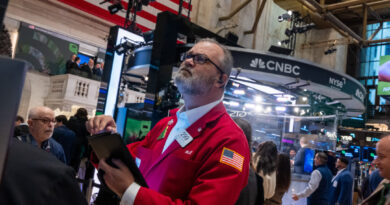American Exceptionalism Drives S&P, Nasdaq Higher for Another Week
News Analysis
The S&P 500 and Nasdaq continued their winning streaks last week, as American exceptionalism—the belief that the U.S. economy stands out from the rest of the world—added hype to Wall Street.
The world’s most closely followed index closed at 6,090, close to its all-time high, up 0.96 percent for the week and 27 percent year-to-date. Nasdaq closed up 3.34 percent for the week and 32 percent year-to-date.
Dow Jones and the Russell 2000 ended the week with slight losses, 0.60 percent, and 1.06 percent, respectively. Despite these losses, both indexes trade near all-time highs.
The iShares MSCI index Germany fund, for instance, is up 15.2 percent year-to-date, the iShares MSCI Japan fund up 11.6 percent, the iShares Belgium index up 3.5 percent, the iShares Italy index up 14 percent, and the iShares France fund is down 2.8 percent.
The growing gulf between U.S. and overseas equity performance has given rise to the narrative of the U.S. economic exceptionalism on Wall Street: The U.S. economy is in a unique virtuous business cycle of solid GDP growth followed by robust job gains, which in turn leads to higher incomes and higher consumer spending feeding into yet higher GDP.
A virtuous cycle of economic growth combined with declining inflation is an ideal environment for equities. Economic growth helps boost the top and bottom lines of listed companies while declining inflation leaves room for the Federal Reserve to cut interest rates. Both feed into the Wall Street rally.
Plenty of evidence supports this narrative, including the third-quarter GDP, National Income, and Personal Spending reports released a couple of weeks ago and the November jobs report released this week.
The GDP report showed the U.S. economy grew at an annualized 2.8 percent in the third quarter of 2024, close to the 3 percent growth in the second quarter. These are solid numbers for a $27 trillion economy in its 17th quarter of almost uninterrupted growth.
This contrasts with the meager GDP growth rates seen across Europe and Japan. Germany’s economic growth, for instance, has been fluctuating between negative and positive territory. France and Italy have virtually no growth, while Japan strives to get out of a three-decade-long stagnation.
Rising personal incomes and robust job growth have boosted personal spending since the first quarter of 2023, driven by a surge in goods consumption and strong spending on services.
This has been music to the ears of U.S. retailers of all stripes, from Costco to Walmart to TJ Maxx, FIVE Below, and Lululemon, all of which have reported solid financial results quarter after quarter, and to traders and investors on Wall Street chasing the shares of these retailers higher.
American exceptionalism and it’s tendency to wax and wane is not a new concept for Michael Ashley Schulman, chartered financial analyst and chief investment officer at Running Point Capital Advisors.
“It depends on the economic, cultural, and political tide, but over the decades, it seems to have increased and flourished in the country’s entrepreneurial spirit/innovation leadership, capital markets, and acceptance of failure to achieve success,” Schulman told The Epoch Times.
“The U.S.’s dollar dominance also helps as it underpins global trade. On the other hand, global competition is always nipping at the country’s heels, but hopefully, that competition spurs further excellence.”
That excellence extends to U.S. equity exchanges.
“More and more so over the last few years, the NYSE and NASDAQ, which have traditionally been American exchanges, have truly become global stock exchanges with a marked increase in foreign IPOs and secondary listings, further elevating the perception,” Schulman said.
Not everyone subscribes to the narrative of American exceptionalism as the critical driver behind the Wall Street rally.
Glen Smith, chief investment officer of GDS Wealth Management, has another theory for Wall Street’s winnowing streak: post-election certainty.
“The stock market is trading at record highs as the market continues to celebrate the post-election certainty that has been attained,” he told The Epoch Times.
“While Wall Street broadly is optimistic, we do not believe we have reached euphoria quite yet, and euphoria is typically a sign that we are at a peak in the market. We believe the bull market has more room to run, albeit with volatility that is par for the course in investing.”





